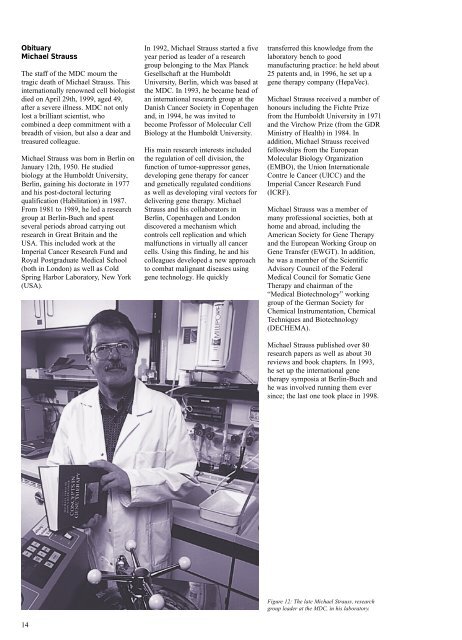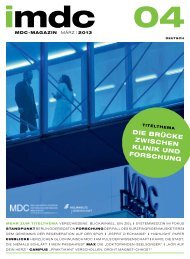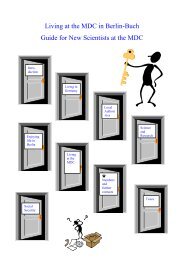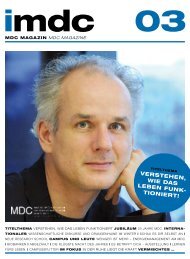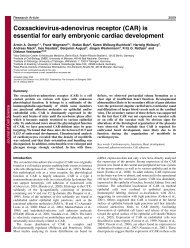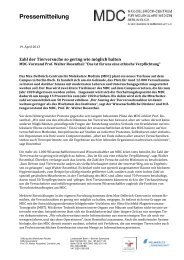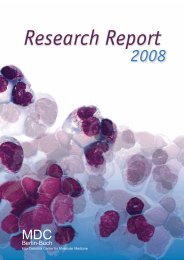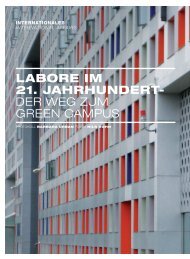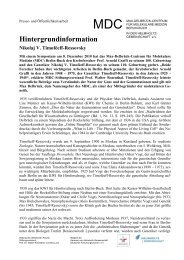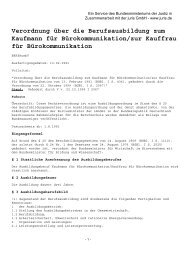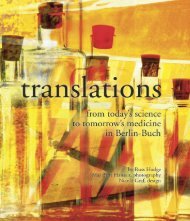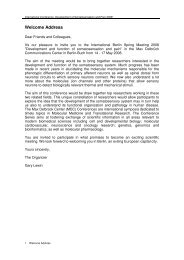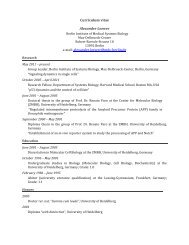You also want an ePaper? Increase the reach of your titles
YUMPU automatically turns print PDFs into web optimized ePapers that Google loves.
Obituary<br />
Michael Strauss<br />
The staff of the <strong>MDC</strong> mourn the<br />
tragic death of Michael Strauss. This<br />
internationally renowned cell biologist<br />
died on April 29th, 1999, aged 49,<br />
after a severe illness. <strong>MDC</strong> not only<br />
lost a brilliant scientist, who<br />
combined a deep commitment with a<br />
breadth of vision, but also a dear and<br />
treasured colleague.<br />
Michael Strauss was born in Berlin on<br />
January 12th, 1950. He studied<br />
biology at the Humboldt University,<br />
Berlin, gaining his doctorate in 1977<br />
and his post-doctoral lecturing<br />
qualification (Habilitation) in 1987.<br />
From 1981 to 1989, he led a research<br />
group at Berlin-Buch and spent<br />
several periods abroad carrying out<br />
research in Great Britain and the<br />
USA. This included work at the<br />
Imperial Cancer <strong>Research</strong> Fund and<br />
Royal Postgraduate Medical School<br />
(both in London) as well as Cold<br />
Spring Harbor Laboratory, New York<br />
(USA).<br />
14<br />
In 1992, Michael Strauss started a five<br />
year period as leader of a research<br />
group belonging to the Max Planck<br />
Gesellschaft at the Humboldt<br />
University, Berlin, which was based at<br />
the <strong>MDC</strong>. In 1993, he became head of<br />
an international research group at the<br />
Danish Cancer Society in Copenhagen<br />
and, in 1994, he was invited to<br />
become Professor of Molecular Cell<br />
Biology at the Humboldt University.<br />
His main research interests included<br />
the regulation of cell division, the<br />
function of tumor-suppressor genes,<br />
developing gene therapy for cancer<br />
and genetically regulated conditions<br />
as well as developing viral vectors for<br />
delivering gene therapy. Michael<br />
Strauss and his collaborators in<br />
Berlin, Copenhagen and London<br />
discovered a mechanism which<br />
controls cell replication and which<br />
malfunctions in virtually all cancer<br />
cells. Using this finding, he and his<br />
colleagues developed a new approach<br />
to combat malignant diseases using<br />
gene technology. He quickly<br />
transferred this knowledge from the<br />
laboratory bench to good<br />
manufacturing practice: he held about<br />
25 patents and, in 1996, he set up a<br />
gene therapy company (HepaVec).<br />
Michael Strauss received a number of<br />
honours including the Fichte Prize<br />
from the Humboldt University in 1971<br />
and the Virchow Prize (from the GDR<br />
Ministry of Health) in 1984. In<br />
addition, Michael Strauss received<br />
fellowships from the European<br />
Molecular Biology Organization<br />
(EMBO), the Union Internationale<br />
Contre le Cancer (UICC) and the<br />
Imperial Cancer <strong>Research</strong> Fund<br />
(ICRF).<br />
Michael Strauss was a member of<br />
many professional societies, both at<br />
home and abroad, including the<br />
American Society for Gene Therapy<br />
and the European Working Group on<br />
Gene Transfer (EWGT). In addition,<br />
he was a member of the Scientific<br />
Advisory Council of the Federal<br />
Medical Council for Somatic Gene<br />
Therapy and chairman of the<br />
“Medical Biotechnology” working<br />
group of the German Society for<br />
Chemical Instrumentation, Chemical<br />
Techniques and Biotechnology<br />
(DECHEMA).<br />
Michael Strauss published over 80<br />
research papers as well as about 30<br />
reviews and book chapters. In 1993,<br />
he set up the international gene<br />
therapy symposia at Berlin-Buch and<br />
he was involved running them ever<br />
since; the last one took place in 1998.<br />
Figure 12: The late Michael Strauss, research<br />
group leader at the <strong>MDC</strong>, in his laboratory.


